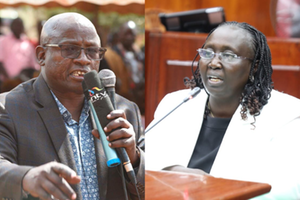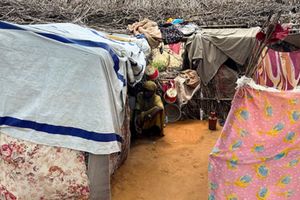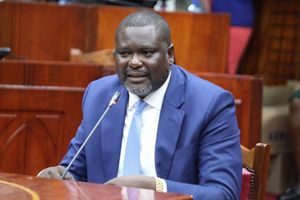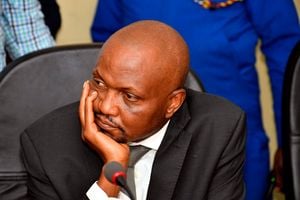
President William Ruto's four Cabinet Secretaries are under close watch by Members of Parliament. The four include Julius Ogamba (Education), Kipchumba Murkomen (Interior), Musalia Mudavadi (Prime Cabinet Secretary) and Aden Duale (Health).
Four Cabinet Secretaries are under close watch by Members of Parliament as they are expected to provide crucial answers regarding various incidents in their respective ministries.
The four include Kipchumba Murkomen (Interior), Musalia Mudavadi (Prime Cabinet Secretary), Aden Duale (Health), and Julius Ogamba (Education).
For Mr Murkomen, MPs are demanding answers about the conduct of police who teargassed students of Butere Girls High School in Nakuru on Thursday and harassed journalists covering the National Drama and Film Festival.
A report from the ministry is demanded by the House on or before Thursday next week.
The matter was raised by Butere MP Tindi Mwale, who is demanding action over how the police handled the students.
Mr Mwale, in a statement, termed the incident unfortunate, saying children were denied an opportunity to express their artistic freedom through the play.
The MP wants the Committee on National Administration and Security to present a report to the House explaining the reasons for the deployment of anti-riot police and the use of teargas.
Mr Mwale said the police action raises serious questions about freedom of expression, as enshrined under Article 33, and the role of police in protecting constitutional rights and freedoms.
He argued that the police's actions constituted a limitation of rights, especially for children.
In addition, the House also wants answers from Mr Murkomen on why anti-riot police were deployed and excessive force was used on children.
For Mr Duale, who recently took over the Health docket in the latest Cabinet reshuffle by President William Ruto, the question concerns government action over the Kala-azar disease that is ravaging communities in the northern region, with more than 30 deaths reported so far.
Session chair David Ochieng, during Wednesday morning's sitting, termed the matter urgent and directed the ministry to provide answers by Tuesday next week.
In his response to the House, Mr Duale is expected to provide a detailed report on the people affected by the disease in Wajir County and to confirm the number of cases, fatalities, and the rate of transmission in the region.
The former Majority Leader is also expected to table an emergency report outlining measures the ministry is implementing to contain the spread of the disease and prevent further infections.
“The ministry should also provide both short-term and long-term measures, including financial, logistical, and medical resources, to ensure there is rapid containment of the virus. As we speak, we have lost over 30 people,” said Eldas MP Adan Keynan, who raised the matter.
Mr Duale is further expected to provide a clear roadmap outlining the ministry’s plans to prevent the disease from spreading to other parts of the country and to ensure those already affected receive quality healthcare.
For the Prime Cabinet Secretary, in his capacity as acting Public Service CS following the sacking of Mr Justin Muturi, a delicate question awaits him on Wednesday next week: how the government classifies hardship areas for civil servants, particularly teachers.
Lawmakers have complained that the government’s classification of hardship areas is skewed, discriminatory, and in need of review to reflect current realities.
The Speaker directed the leadership to invite Mr Mudavadi to appear before the House to respond and explain the criteria used for classification.
“This is not just about allowances, it’s about fairness, service delivery, and development justice,” Mr Wetang’ula said.
“Ahero is not a hardship area, yet neighbouring Nyakach—which is better than Ahero—is classified as hardship. Muhoroni, a productive area, is classified as hardship, but Ahero, which is ravaged by floods, is not. What criteria is being used?” he asked.
Gilgil MP Martha Wangari said the criteria for classifying hardship areas needs review, as many dynamics have changed since independence.
“You cannot say that Kenya before devolution is the same as it was in the 1960s. There are areas that were classified as hardship back then, but due to development, they no longer are. Let us know the parameters used, whether they change, and who decides that,” Ms Wangari said.
For Mr Ogamba, the House is demanding a solution regarding discrimination against Kenya Medical Training College (KMTC) students in accessing Higher Education Loans Board (HELB) funds.
The matter was raised by Balambala MP Abdi Shurie, who termed it discrimination against KMTC students.
“Explain why KMTC students are excluded from receiving HELB support, while students from other public institutions are eligible beneficiaries?” he asked.
Speaker Wetang’ula directed the Committees on Health and Education to arrange a meeting with the CS over the matter and bring a report to the House in two weeks.
“Arrange for a meeting with the CS on the steps taken to ensure that KMTC students access HELB loan facilities, just like students from other public tertiary institutions. These are public resources, and these are deserving cases,” the Speaker said.
Mr Ogamba is also expected to provide a comprehensive explanation regarding the employment of teachers, with MPs complaining that those who graduated earlier are being overlooked in favour of recent graduates.
The matter came up during a meeting between the Teachers Service Commission and the National Assembly’s Constitutional Implementation and Oversight Committee (CIOC).
Mr Ogamba will also face questions about the Butere Girls High School play and the controversy surrounding it.
smundu@ke.nationmedia.com









